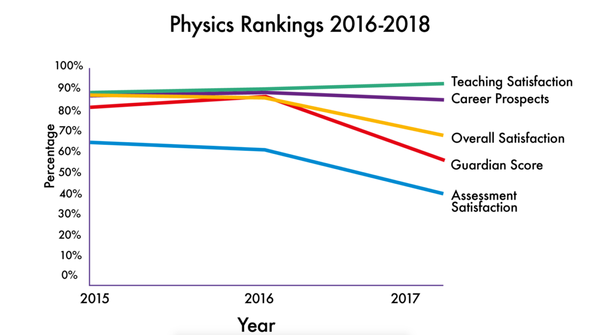Imperial academics on Trump and climate
The Grantham Institute spills the beans
Last week Trump declared to the world that he’d be pulling the US out of the Paris Agreement. Within hours, Elon Musk resigned from the President’s Board of Advisors, American states such as California went rogue and protested the move, vouching to uphold their commitment anyway, and world leaders expressed their disappointment and their determination to do their bit for the planet.
Surprisingly, Trump’s war on sustainability seems to have united almost everyone else against him. The acting head of the US embassy in Beijing resigned over his country’s withdrawal from the Paris climate change accord. France, Germany and Italy penned a joint letter condemning Trump’s decision (Theresa May reportedly declined to co-sign the statement). By Monday over 1,000 mayors, governors and companies in the US had expressed defiance to Washington. And yes, even North Korea called out the decision, branding it “short-sighted and silly”.
Climate change is rightfully the hottest topic of discussion at the moment, so we talked to some of Imperial’s leading scientists to see what they’re making of this turn of events. And what better place to find them than the Grantham Institute.
The Grantham Institute does multidisciplinary research, engaging with staff and students across College interested in climate change. Jo Haigh is one of the institute’s Co-Directors and has notably contributed to (and lead authored) several reports of the Intergovernmental Panel on Climate Change, so naturally she was more than happy to discuss recent developments. The Paris Accord was a triumph that not only surprised everyone at the time but keeps pleasantly surprising scientists across the globe.
“You can’t imagine how fantastic it was, because previous to that we had the Copenhagen meeting which was such a disappointment,” Haigh tells me as I sit across her in her office . “We were all hoping there’d be a climate agreement and it got absolutely nowhere. This time round we were thinking if they can just agree on anything it will be so good. And not only did they have a unanimous agreement but they agreed to try and limit global temperature increase to less than two degrees above pre-industrial [levels] or preferably 1.5 degrees. This was signed up and agreed and then less than a year later it got ratified. I think this is the fastest any treaty has been ratified through the United Nations.”
The Paris Agreement is based on voluntary contributions to reducing CO2 emissions. It has been criticised for not providing a legal framework for keeping the international community in check. Realistically, even if signatories fulfilled their pledges, we would be nowhere near hitting the two degree target. But that’s not the point. (Besides, there are mechanisms for reassessing goals and moving action forward every five years). The success of the Paris agreement lies in the declaration of global intent to do something about climate change and the exit of a major player like the USA jeopardises the spirit of unity.
“The USA is estimated to be contributing nearly 20% of the world’s CO2 emissions. Pulling out is no minor event," says Haigh. "The thought that the US wouldn’t do anything to mitigate climate change is bad in itself but it could also be bad in the sense that other countries might think likewise – if they’re not doing it, why would we bother – and the whole thing could unravel.”
Alyssa Gilbert, Head of Policy and Translation at the Grantham Institute, agrees. “A lot needs to be done locally. The issue is that you need everyone to agree that we need to make an effort. That’s why we have these big international agreements. We all need to play our part, which is why the US detaching is distressing.”
Gilbert’s role bridges the work and knowledge of academic researchers and the action of stakeholders who make decisions that impact the environment, such as NGOs and governmental bodies. Gilbert essentially ensures that the science is effectively communicated to the public and translated into policy. Which begs the question: What motivated Trump’s decision? Was it a communication failure?
Gilbert doesn’t think so.
“In no time in his speech about leaving the Paris Agreement did Donald Trump say anything skeptical about climate change. Whether that’s because he’s a climate skeptic remains to be seen but the bit of the story that’s telling us what the science says about the world around us seems to have had quite a significant message delivery over time.”
Indeed, not only has scientific evidence for global climate change been piling up over the last decades, some effects are frankly impossible to ignore, such as the very measurable one degree increase in average global temperatures since the beginning of the conversation.
Gilbert thinks climate-skepticism is not really the issue anymore, instead the real challenge is in convincing people that urgent action is needed. “Trump’s decision to withdraw is really purely a political one. It’s where most Republicans align themselves with,” she says. How this anti-sustainability ideology works is unclear. It might as well be a communication failure. “It might be not being able to communicate with people outside our usual audiences but also not being able to make messages meet the value sets of different groups of people.”
For now, Trump’s inflammatory remarks are just that, and are unlikely to have immediate effects. Already many other countries have been turning green at surprising paces. India and China are making huge leaps in sustainable development. According to data from the Central Electricity Authority, India’s solar contribution to electricity generation increased by 81% in the last financial year. Meanwhile China is considered a leader in solar expansion. But even with other countries picking up the slack, to mitigate climate change we will need to eventually zero carbon emission and to achieve that we will need global cooperation.
In the future, Haigh entertains a scenario where the American government could face legal consequences as a result of its inaction. “Legally the American government is required to reduce CO2, and somebody in the US could take the government to court because they’re not doing their legally bound duty. There’s also a possibility that poorer countries in the world could sue the US for loss and damage, because they’re the one that are being harmed most by the actions of the polluters.” Already a group of American teens and preteens are suing President Obama and various federal agencies for failing to protect the Earth’s natural resources for future generations. Imagine the case they’d launch against Trump.
“I feel that Donald Trump has declared war on us and our planet,” says Sir Brian Hoskins, Chair of the Grantham Institute. “I hope that the very positive actions in many US States, cities and companies and the support from the majority of its people will matter more.”








